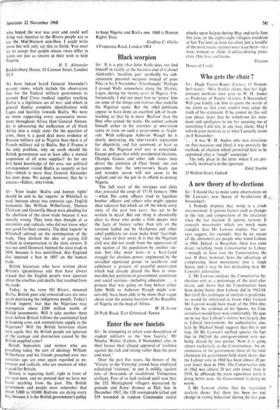Black scorpion
Sir: It is a pity that John Wells does not find himself in reality at the business end of Colonel Adekunle's 'machine gun' (probably his sub- automatic personal weapon) instead of poor Piles in his 8 November 'Afterthought.' Perhaps
I passed Wells somewhere along the Marina, Lagos, during my twenty years in Nigeria. Un- fortunately, I did not meet him to 'prime' him on some of the things and motives that underlie the Nigerian scene. But the rebel publicists appear to have done an excellent job of brain- washing-so that he is more 'Biafran' than the Ibos who coined the name. He cannot contain himself either in his attempts at SPECTATOR satire or even on such a programme as Night- ride. With colleague Auberon Waugh he is slowly destroying the SPECTATOR'S reputation for objectivity and fair comment, at least as far as the Nigerian civil war is concerned. Except perhaps that while presidential elections, Olympic Games and other side issues may divert the attention of Fleet Street, one can guarantee that the SPECTATOR'S beady eye and wooden spoon will not cease to be vigilant and stir the pot in its efforts to destroy Nigeria.
The full story of the intrigues and plots that preceded the coup of 15/16 January 1966 —when Ibo army officers tried to liquidate brother officers and others who might oppose their takeover bid which set off the whole sorry story of the past two years—has yet to be written in detail. But one thing is abundantly clear to those who probe a little deeper into the facts of history rather than rely on the versions ladled out by Markpress and other rebel publicists (or even make brief 'fact-find- ing' visits of their own). It is that the Nigerian civil war did not result from the oppression of one section of the population by another sec- tion but—like most wars—is a bare-faced struggle for absolute power, engineered by the so-called oppressed group. to accelerate and culminate a process of peaceful penetration which had already placed the Ibos in innu- merable key positions in government, commerce and social services—including education . . . a process that was going on long before either John Wells or Auberon Waugh might con- ceivably have been able to be more than vague about even the precise location of the Republic of Nigeria on the map of Africa.


































 Previous page
Previous page